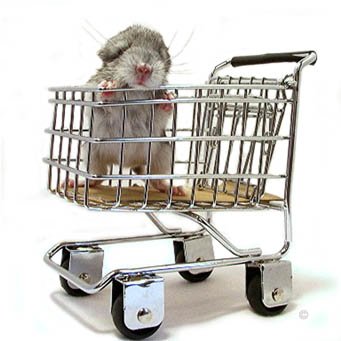 Before you buy a chinchilla you should carefully consider a few points first. The most important factor will be whether a chinchilla is the correct type of pet for you and your lifestyle.
Before you buy a chinchilla you should carefully consider a few points first. The most important factor will be whether a chinchilla is the correct type of pet for you and your lifestyle.
Below are some truths about buying a chinchilla, which you should read through before making the final decision to buy...
Under no circumstances should you buy a chinchilla that is under 12 weeks old! This is the amount of time it takes to a wean a baby chinchilla (kit) properly. Chinchillas learn from their chin-parents and all chinchillas have their own individual learning rates just like us, therefore if taken too soon from a chin-mum, some chinchillas can experience health and behavior problems.
Chinchillas live for a very long time considering the life span of other rodents and this should strongly be considered before buying a chinchilla. The average pet chinchilla lives approximately 10-15 years but with good genetics and husbandry a chinchilla can live up to 20+ years. Before you buy a chinchilla you should consider what life plans you have for the next decade (at least) and decide whether a chinchilla fits comfortably into those plans. A chinchilla will need a stable and safe environment during that entire 'long term commitment' and buying a chinchilla to serve a current purpose to then dispose of when they no longer fit in, is not good chinchilla parenting and must be avoided!
Chinchillas will need daily exercise outside their cage environment for a minimum of 1-2 hours per night especially if the chinchilla will live on its own. Before you buy a chinchilla you should fully understand how destructive a chinchilla can be. This behavior comes naturally to chinchillas as they search for objects to gnaw and file their teeth, just as they would do in the wild.
Chinchillas are just like having young children and in some respects can be worse. This must be remembered before you buy a chinchilla as their minds can quickly become bored and stressed (triggering health and behavior problems). Chinchillas eat painted wood work, chew toxic plaster off you walls, gnaw on live electrical wiring, eat pot plants whether they are poisonous or not and this means you have to change your surroundings to prevent any harm coming to them. Whilst out to play, windows must be kept closed, electrical wiring hidden, small cavities blocked and remove any objects that can fall on them (and so on).
Before you consider buying a chinchilla one thing you should definitely think about are vet bills. Chinchillas are classed as exotic animals and a veterinary surgeon should have the extra skills to deal with these type of animals. Vet bills can accumulate very quickly and you must be willing to take a chinchilla to a veterinary surgeon on a regular basis for dental check-ups and not let cost prevent you.
Chinchillas are expensive to keep and this should definitely be considered before you buy a chinchilla. Not only is there on-going vet bills for check-ups and potential treatments but they need a large cage to live in (cages sold in pet shops, although advertised as chinchilla cages, really aren't big enough), a variety of good quality coarse hay and items to gnaw on all of which do not come cheap.
Chinchillas generally don't like to to be handled much and this is an important factor to consider if you are a buying a chinchilla for a loving companion. Chinchillas are very loving if treated properly but they like to be free and have things on their own terms. They are not known to be sedentary 'lap' animals although you may occasionally find a chinchilla that likes to be rubbed around the ears or under the chin. Although it is important to regularly handle a chinchilla for when you need to go to the vet, they very rarely enjoy it.
Chinchilla's products can potentially trigger allergic reactions depending on the type of allergy you have. Chinchillas themselves are not hypoallergenic nor is the hay itself or dust they use but depending on your allergy - for example pollen sensitivity - certain products such as hay particles, may trigger a reaction.
Chinchillas are nocturnal therefore if you like a peaceful night sleep and relaxing watching TV in the evening then you should not buy a chinchilla. Chinchillas need lots of interaction during the evening time and do not appreciate you sitting ignoring them watching television. They also crash around in their cage whilst you sleep but do not appreciate you doing the same to them when they are trying to sleep. Chinchillas need continued peace and quiet whilst they are sleeping during the daytime hours, sudden loud noises and broken sleep patterns can trigger disorders such as fur biting or digestive upset.
Chinchillas must be housed inside within a climate controlled environment. They do not bode well in fluctuations in temperature and easily suffer heat stroke in warm climates.
Buying a chinchilla is not a good idea if you like to go away on holiday a lot. They are high maintenance animals which need on a daily basis: fresh water, pellets, hay, exercise outside the cage for a minimum of 1 hour, weekly cage cleaning/disinfecting, weekly examinations and so on. In your absence, you will need to make sure someone attends to your chinchilla, although sometimes this is not enough, especially if its a lone chinchilla. The loss of a chinchilla's owner is a stressful situation to a lone chinchilla as it looks at the owner as its mate. You should only buy a chinchilla if you know you can make these commitments to a chinchilla during its entire lifetime.
Chinchillas regularly breed and if you decide to buy a pair of chinchillas then you must consider the serious responsibility of chinchilla offspring. If you buy a chinchilla we recommend having the male neutered to prevent more unwanted chinchillas ending up in rescue homes. The responsibility of breeding chinchillas is massive and should be left up to the breeders we currently have today - there is no more room in the rescue homes for anymore chinchillas!
So You Want To Buy A Chinchilla - What Next...
When buying a chinchilla, the sex really does not matter apart from if you are thinking of introducing pairs. The temperament of both sexes is generally docile, gentle and intelligent unless provoked after which a female chinchilla will 'spray urine' if she becomes angry or threatened. It has been said that males do bond easier with humans and are more extrovert than their female counterpart - they are also known to bond with humans better, especially if they are a lone chinchilla but this is no way a guarantee.
Buying A Chinchilla From A Pet Shop, Breeder or Adoption?
 Pet Shop - Some pet shops will not display their chinchillas as they are nocturnal and daytime noise will stress them. If a pet shop does offer chinchillas on display, take a look into the cage and see how they are living. Check the pet shop is prepared to give you advice and guide you, not only through the purchase, but also as an 'aftercare-advice' service. Ensure that they are happy for you to handle the chinchilla under their supervision before buying the chinchilla, so you can perform a chinchilla examination. If a pet shop refuses, decline the chinchilla and find somewhere happy for you to check the chinchilla's health and well-being before you buy. Pet shops regularly 'mis-sex' chinchillas mistaking the female's urethral cone for a male's penis. Therefore, if you buy a chinchilla from a pet shop make sure you learn the differences between the genders by 'handling' and 'examining' the chinchilla before you commit to buying.
Pet Shop - Some pet shops will not display their chinchillas as they are nocturnal and daytime noise will stress them. If a pet shop does offer chinchillas on display, take a look into the cage and see how they are living. Check the pet shop is prepared to give you advice and guide you, not only through the purchase, but also as an 'aftercare-advice' service. Ensure that they are happy for you to handle the chinchilla under their supervision before buying the chinchilla, so you can perform a chinchilla examination. If a pet shop refuses, decline the chinchilla and find somewhere happy for you to check the chinchilla's health and well-being before you buy. Pet shops regularly 'mis-sex' chinchillas mistaking the female's urethral cone for a male's penis. Therefore, if you buy a chinchilla from a pet shop make sure you learn the differences between the genders by 'handling' and 'examining' the chinchilla before you commit to buying.
Breeder - You can also buy a chinchilla from a respected breeder, this can have an added benefit of seeing the chinchillas when they are awake in the evening You can view them in their home environment and also receive expert knowledge regarding a particular chinchilla from its present breeder. The breeder can tell you about the chinchillas parents, whether there are any health issues to watch out for and the temperament of the chinchilla you are thinking of buying.
Stranger - There are many websites or private owners selling their chinchillas. Make sure you are able to see the chinchillas first and be able to handle and examine them. Ask the current owner why they are selling the chinchilla and are there any current health issues arising. Some private chinchilla owners are looking to rehome their chinchillas and these chinchillas are certainly worth consideration before they potentially end up in the already over-cluttered rescue home.
Adoption - Don't buy a chinchilla - consider adoption instead. There are many unwanted chinchillas out there which need a good loving home. As sad as this already is, the horrific truth is many chinchillas are 'put-to-sleep' because of overcrowding from the amount needing new homes, which are not forthcoming. As a new potential owner, you can relieve some of this pressure within the chinchilla rescue centres and help an unwanted chinchilla to find that new home. A great benefit in housing an adopted chinchilla is generally they are more mature and have learnt certain skills as well as being tame - meaning all the hard work has been done for you!
When you are ready to go and buy your chinchilla you will need some basic items ready for its arrival and the correct nutrition to feed your chinchilla. Take a look through the links below as they all relate to the early stages of owning a chinchilla and help prepare you for what is needed as well as what to expect.
Further Reading Relating To Buying A Chinchilla:
An Essential Guide To Owning A Chinchilla, Chinchilla A-Z Health & Sickness Bible, Chinchilla Cage, Chinchilla Care, Chinchilla Health, Chinchillas For Sale, Examining A Chinchilla, Holding A Chinchilla, Introducing Chinchillas, Nutrition (Food & Diet), Sounds & Postures, Taming A Chinchilla, The Chinchilla, Toys & Accessories.


 Before you buy a chinchilla you should carefully consider a few points first. The most important factor will be whether a chinchilla is the correct type of pet for you and your lifestyle.
Before you buy a chinchilla you should carefully consider a few points first. The most important factor will be whether a chinchilla is the correct type of pet for you and your lifestyle.